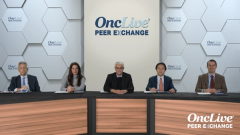
CAR T-cell Therapy in Relapsed/Refractory Mantle Cell Lymphoma
A brief review of CAR T-cell therapy in relapsed/refractory mantle cell lymphoma as studied in the ZUMA-2 clinical trial of brexucabtagene autoleucel.
Episodes in this series

Transcript:
Bijal D. Shah, MD, MS: This is a perfect segue to CAR [chimeric antigen receptor] T-cell therapy. Caron, you were part of a real-world consortium data set looking at CAR T. Now, when CAR T was first studied on the ZUMA-2 clinical trial, it was for BTKi [Bruton tyrosine kinase inhibitor] intolerance or resistance. Where are we now?
Caron A. Jacobson, MD, MPH: Well, I think the first place we are is that the FDA actually approved a much broader label, so it’s any relapsed or refractory mantle cell lymphoma. I think it was a very forward-thinking approval because of all of the studies that are now incorporating BTK inhibitors in the frontline setting, you don’t want patients to have to have gone through 2 lines of therapy if all of the effective therapies are being given in the front line. Thus, I think that was very forward thinking.
It is available now for patients with any relapsed/refractory mantle cell lymphoma. The vast majority of patients in the real world, as we’ve seen from 2 different series, one from Europe and one from the United States, have seen a BTKi. But what’s very interesting is there were about 18% of patients in the US series, which was about 96 patients I think in total, who had not seen a prior BTKi, and their results following brexucabtagene autoleucel were identical to patients who had seen a BTKi. I think this is the big question, is prior exposure to a BTKi important for T-cell fitness and the T-cell product, and at least from this very small cohort, it suggests that maybe it is not as important as we might have thought.
I think the data from ZUMA-2 have been replicated in these real-world series. Just like we’ve seen in large cell lymphoma, it’s very consistent. The response rates are consistent, the CR [complete response] rates of nearly 70% are consistent, and so far, what we’re seeing in terms of the 1-year progression-free and overall survival are very consistent, and the toxicities are consistent. I think 70% of patients would not have been eligible for the pivotal clinical trials. So we can now apply these therapies to a broader population of patients: patients with renal failure, heart failure, lower blood cell counts and bone marrow dysfunction, and still see the same excellent results. They continue to be really transformative, I think, for our patients.
Bijal D. Shah, MD, MS: That’s incredible. Thank you.
Transcript edited for clarity.







































